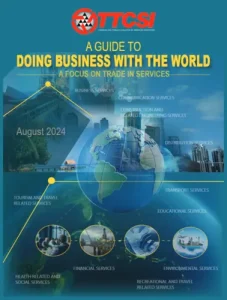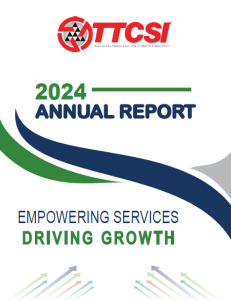ICT and Sustainable Development
Rabindra Jaggernauth – President of Trinidad and Tobago Coalition of Services Industries
Let me start off by thanking Mr Aneesh Chopra for joining us and sharing his insights into ICT’s multifaceted role in national development. Your work in improving your nation’s job market, health system and security through the use of ICT corresponds directly with three major areas of concern in Trinidad & Tobago. We hope to learn a lot from you today and in the future.
As a tireless advocate of technological innovation myself, I marvel at the foresight that prompted your government to develop such a portfolio. More importantly, I’m impressed by the political will that puts actual weight behind the role, and chooses to implement CTO-developed measures, rather than simply talk about them. The focus, as you once put it, is on the verbs, rather than the nouns.
But my surprise might be misplaced. The United States has long championed technological innovation as one of the cornerstones of its global leadership of numerous industries. A renewed inventive vigour can only be seen as a logical step towards maintaining that position among today’s shifting economic tides. The development of new solutions to old challenges has never been more important to those of us who choose to compete at an international level.
And this brings me to my main point: If the United States, a centuries-old titan in innovative thinking, can find its dominance challenged, then where can we expect to eventually find ourselves if we don’t soon emerge from our current comfort zone?
Trinidad & Tobago’s very survival as an aspiring player in the global arena depends primarily on us embracing the ideals embodied by Aneesh Chopra’s former portfolio. And the first area we need to focus our industry’s best and brightest on is that of sustainable development.
ICT is heavily touted as one of this Government’s seven pillars for sustainable development, and I applaud the decision to place technological innovation at or near the centre of our long-term plans. However, the reality we see playing out before us is less encouraging. While other countries are making significant strides forward and leveraging on ICT to make themselves more globally competitive, Trinidad has been making only minimal improvements year after year. If ICT is expected to drive us towards so many of our developmental goals, the ugly truth is that we are not headed for success.
As a fossil fuel-rich nation, Trinidad & Tobago is no stranger to establishing efficient frameworks for the exploitation of lucrative resources. ICT and intellectual capital must be regarded as even more beneficial to our growth than oil and gas. As it has done in the past under the Point Lisas model, Government must take a central role in soliciting and supporting ICT-focused initiatives for sustainable development. An open, collaborative environment for national ICT advancement, much like the one Mr Chopra advocates, must be established. For that, we need vision, human and economic resources, and clearly defined roles and responsibilities. As it did decades ago with the establishment of our petroleum sector, the government must be the first enthusiastic investor in the ICT industry. Moreover, the government must maintain a clear focus and exert forceful, unerring political will in the implementation of its initiatives in priority areas. Finally, there must be consistent analysis of the results of every step in this journey.
When we examine these prerequisites within a T&T context, we find that we are good at defining visions, as exemplified by the new National ICT Plan. We definitely have the resources, and from an infrastructure perspective we are doing excellently. Work is currently being undertaken to widen broadband reach into remote communities, and The Tamana InTech Park, even with its downgraded scope, should cement our ability to facilitate real ICT advancement. The Ministry of Science and Technology is a step in the right direction in defining roles and responsibilities.
The bottom line, though, is that we have invested millions into ICT development over the last decade, but from an industry perspective, we have little to show for it. We need to determine the factors behind this underachievement.
While Aneesh will be providing a lot of insight today and our other guest speakers will provide their perspective, I will provide a few of my thoughts.
With regard to the IT sector, entrepreneurship is alive and well within the private sector and there are numerous small companies and a few large corporations providing a variety of IT services. But barring a couple of companies, our perspective is largely focused on the T&T market and to some extent the regional market. While we seek to do this, others from outside the region comes along and bid for and win the larger projects. From an IT sector development perspective, this is not desirable. While I do not advocate a protectionist approach, I would like to see our IT industry grow as there is enormous potential for this with a country like ours. Like Singapore, we must not be secondary actors in the creation and maintenance of our information sector.
This does not mean, of course, that I’m unaware of the importance of foreign collaboration. We cannot and should not accomplish this mission by ourselves solely using our own resources. We have to partner internationally, and set up an environment where we have IT investors willing to establish companies in T&T. Again, the ICT sector has much to gain by taking cues from the Point Lisas industrial model.
One unfortunately overlooked aspect of ICT-based sustainable development has been e-commerce. I have made repeated calls in the past for online transactions to be more widely offered by both the private and public sector. The unavailability of online payment options from so many of our largest companies is downright archaic, and the legislative framework is still wanting. E-commerce presents the perfect facility with which to emphasise the importance of ICT development to consumers and ordinary citizens, and should not be a secondary focus. The opportunities it could present to both small and large enterprise is limitless. We already have a situation where many T&T shoppers choose the ease and convenience of purchasing items online from abroad, despite the availability of the same items in local business.
We need someone who will deliver more than just idle talk when it comes to living up to our full potential. We need someone who will champion the development of the IT sector. We need to hand the reins over to someone who understands the sector and is willingly to passionately promote T&T as a locale for establishing a vibrant IT industry. Until we have such a person we will not be able to establish a globally competitive IT sector.
It is my hope that Mr Aneesh Chopra, a man who held a somewhat similar position in his own government, can provide even more pointers from his perspective that will assist us in the sustainable development of our ICT sector. I’ll now hand you over to him.





